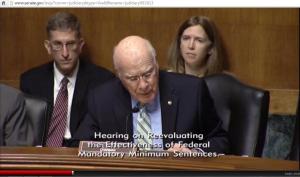Sens. Patrick Leahy and Rand Paul led the charge for mandatory minimum sentencing reform at a Judiciary Committee hearing last week. The adminstration and the federal judiciary are already on board; now, it's time for Congress to step up to the plate.
Prescription heroin is coming to Canada, at least on a limited basis, whether the Conservative government likes it or not. Health Canada has okayed it, despite the protests of the health minister.
Attorney General Holder Thursday announced that his directive to federal prosecutors to not seek mandatory minimum sentences against most drug offenders will also apply to those already charged but not yet imprisoned.
The times, they are a-changing, indeed. Majority support for marijuana law reform is popping up in the darnedest places, first Louisiana, and now, Oklahoma.
Oregon begins moving toward a regulated dispensary system, Massachusetts advances down the dispensary path, New Jersey's governor signs a medical marijuana bill, and much, much more.
A bill that would require people to take employer drug tests or lose their unemployment eligibility is moving in Michigan.
When it comes to marijuana, Bermuda is best known for hassling cruise ship passengers over small amounts, but things could be changing there.
The police killers of ex-Marine Jose Guerena during a drug raid gone bad escaped charges, but their employers will pay millions.
We have a doozy of a corruption tale out of West Virginia, a pair of Kentucky deputies get caught peddling pills, and a Georgia deputy gets nailed for selling weed from his cop cruiser.
The Senate Judiciary Committee held a hearing on mandatory minimum sentencing last Wednesday as Chairman Sen. Patrick Leahy (D-VT) and fellow committee member Sen. Rand Paul (R-KY) sought to create momentum for a reform bill they filed together this spring, the Justice Safety Valve Act (Senate Bill 619).

Senate Judiciary Committee, hearing on mandatory minimums -- Rand Paul waiting to testify
The hearing comes in the face of a federal prison population that has increased seven-fold in the past 30 years, driven in large part by mandatory minimum sentences, the number of which has doubled in the past 20 years. Many of them are aimed at drug offenders, who make up almost half of all federal prisoners. Taxpayers are shelling out more than $6.4 billion this fiscal year to pay for all those prisoners.
Mandatory minimum sentencing reform has already won support from the Obama administration, with Attorney General Eric Holder last month issuing guidance to federal prosecutors instructing them not to pursue charges with mandatory minimums in certain drug cases and announcing last week that the shift would also include people who have already been charged, but not convicted or sentenced.
And it has support on the federal bench. The same day as the hearing last week, Judge Robert Holmes Bell, chairman of the criminal law committee of the US Judicial Conference, sent a letter to the committee expressing the federal judiciary's position that mandatory minimums lead to "unjust results" and its "strong support" for the Justice Safety Valve Act. The letter noted that the federal judiciary has a longstanding policy of opposing mandatory minimums.
The hearing began with an extended photo-op and media availability as Sens. Leahy and Paul chatted before the cameras in an exercise in bipartisan camaraderie.
"Senator Paul and I believe that judges, not legislators, are in the best position to evaluate individual cases and determine appropriate sentences," said Leahy. "Our bipartisan legislation has received support from across the political spectrum."
Leahy noted the Justice Department's recent moves on mandatory minimums, but said that wasn't enough.
"The Department of Justice cannot solve this problem on its own," Leahy said. "Congress must act. We cannot afford to stay on our current path. Reducing mandatory minimum sentences, which have proven unnecessary to public safety, is an important reform that our federal system desperately needs. This is not a political solution -- it is a practical one, and it is long overdue."
Paul, for his part, was on fire at the hearing. The libertarian-leaning junior senator from Kentucky decried not only the inequity of the harsh punishments but also of policies that disproportionately affect racial minorities.
"I know a guy about my age in Kentucky who grew marijuana plants in his apartment closet in college," Paul related. "Thirty years later, he still can't vote, can't own a gun, and when he looks for work, he must check the box, the box that basically says, 'I'm a convicted felon, and I guess I'll always be one.'"
It wasn't just white guy pot offenders Paul was sticking up for.

Pat Leahy
"If I told you that one out of three African-American males is forbidden by law from voting, you might think I was talking about Jim Crow 50 years ago," Paul said. "Yet today, a third of African-American males are still prevented from voting because of the war on drugs. The majority of illegal drug users and dealers nationwide are white, but three-fourths of all people in prison for drug offenses are African American or Latino."
As was the case with the Judiciary Committee hearings on marijuana law reform earlier this month, octogenarian Sen. Charles Grassley (R-IA) appeared to be the sole holdout for maintaining harsh war on drugs policies. Grassley, the ranking minority member on the committee, complained that the move to pull back on mandatory minimums ignored the fact that the law was originally written to address sentencing disparities based on judicial discretion.
"No longer would sentences turn on which judge a criminal appeared before," Grassley said before criticizing the Supreme Court for making federal sentencing guidelines advisory and the Obama administration for citing prison costs as a reason to reduce mandatory minimums. "So we have this oddity, this administration finally found one area of spending it wants to cut," Grassley complained.
Among witnesses at the hearing, only Scott Burns, formerly of the drug czar's office and currently executive director of the National District Attorney's Association, sided with Grassley. He said crime is down and it is a myth that the federal system is in crisis.
"Prosecutors have many tools to choose from in doing their part to drive down crime and keep communities safe and one of those important tools has been mandatory minimum sentences," Burns said.
But other witnesses, including former US Attorney for Utah Brett Tolman, disagreed. Tolman told the committee that the mandatory minimum sentencing structure was inherently unfair because it put all discretion in the hands of prosecutors, who have a vested interest in securing convictions and harsh sentences. Political concerns of prosecutors rather than the public safety too often drive charging decisions, which should instead be left up to judges, he said.
Even conservative witnesses agreed that mandatory minimum sentencing had become excessive.
"The pendulum swung too far, and we swept in too many low-level, nonviolent offenders," said Mark Levin, policy director of the Right on Crime Initiative of the Texas Public Policy Foundation, a leading voice in the conservative criminal justice reform movement.
The bill has been filed, the hearing has been held, support has been made evident. Now, it is up to the Congress to move on the Justice Safety Valve Act and other pending sentencing reform legislation.
back to top
Last Friday, Health Canada used some creative rule-reading to approve a program that would provide prescription heroin to a small number of hard-core users, and the Conservative health minister isn't happy. But doctors, advocates, and the users themselves are quite pleased -- and once again, Canada stays on the cutting edge when it comes to dealing smartly with heroin use.
Health Canada approved access to prescription heroin for at least 15 people who are completing their participation in Vancouver's Study to Assess Long-term
Opioid Dependence (
SALOME), which is testing whether prescribing heroin was more effective than prescribing methadone for users who have proven resistant to conventional treatments. The move came after participants and advocates have been calling for an "exit strategy" for the 322 people in the study.
SALOME began at the end of 2011 and has been enrolling participants on a rolling basis for a year at a time. The final group of participants will finish up at the end of next year. It built on the success of the North American Opioid Maintenance Initiative (NAOMI), a study in Vancouver and Montreal from 2005 to 2008. That study found that using heroin is cheaper and more effective than using methadone to treat recalcitrant heroin users.
While the Conservative federal government has been a staunch opponent of heroin maintenance, not to mention also fighting a bitter losing battle to close down the Vancouver safe injection site, Health Canada bureaucrats were able to find a loophole that will allow doctors to prescribe heroin to graduating study participants under the ministry's Special Access Program (SAP).
That program is designed to provide drugs to Canadians with life-threatening illnesses on a "compassionate or emergency" basis. The SAP includes "pharmaceutical, biologic and radiopharmaceutical products that are not approved for sale in Canada." The program covers diseases including intractable depression, epilepsy, transplant rejection and hemophilia, but heroin addiction isn't mentioned.
"Health Canada made a wonderful decision," said Scott Bernstein, Health and Drug Policy Lawyer for the Vancouver-based Pivot Legal Aid Society, which represents 22 SALOME participants and the BC Association of People on Methadone in order to advocate for their continued access to health care and the protection of their human rights. "The decision was one based on the evidence and not ideology. It means that those SALOME participants allowed access can live safer, more stable lives, lives free of crime and remaining under the care of doctors, not drug dealers."
But Health Minister Rona Ambrose appeared to have been caught flat-footed by the Health Canada decision. She issued a statement the same day decrying the move, saying that it contradicted the government's anti-drug stance.

Pharmaceutical diacetylmorphine AKA heroin (wikimedia.org)
"Our government takes seriously the harm caused by dangerous and addictive drugs," Ambrose said. "Earlier today, officials at Health Canada made the decision to approve an application under the Special Access Program's current regulations to give heroin to heroin users -- not to treat an underlying medical condition, but simply to allow them to continue to have access to heroin for their addiction even though other safe treatments for heroin addiction, such as methadone, are available."
The move is "in direct opposition to the government's anti-drug policy and violates the spirit and intent of the Special Access Program," Ambrose said, adding that she would take action to "protect the integrity of the (SAP) and ensure this does not happen again."
Ambrose's remarks prompted a Monday response from SNAP (the SALOME/NAOMI Patients Association), comprised of "the only patients in North America to be part of two heroin-assisted treatment (HAT) clinical trials" -- NAOMI and SALOME. SNAP noted that European heroin-assisted treatment trials had allowed participants to continue to be prescribed heroin on compassionate grounds after the trials ended and that "heroin-assisted therapy is an effective and safe treatment that improves physical and psychological health when the participants are receiving treatment."
"The Canadian NAOMI trial is the only heroin-assisted treatment study that failed to continue offering HAT to its participants when the trial ended in Vancouver," SNAP said. "We do not want to see the same outcome for the SALOME trial. Currently, SALOME patients are being offered oral hydromorphone when they exit the trial. However, there is currently no scientific evidence to support this treatment option for opiate addiction in the doses required; thus we urge you to reconsider your comments and to support Health Canada's decision to grant special access to heroin for patients exiting the SALOME trial. We also urge Canadians to support the immediate establishment of a permanent HAT program in Vancouver, BC."
Patients and their supporters weren't the only ones supporting the Health Canada move and criticizing Minister Ambrose for her opposition. New Democratic Party health critic Libby Davies also had some choice words for her.
Davies was "outraged" that Ambrose would "overrule her own experts," she said. "Medicalized heroin maintenance has been used very successfully in places like Europe. It's another example of the Conservative government ignoring sound public policy, instead making decisions based on political dogma."
Indeed, while Canada has been on the cutting edge of opiate maintenance in North America, being the scene of the hemisphere's only safe injection site and heroin-maintenance studies, similar moves have been afoot in Europe for some time. Prescription heroin programs have been established in several European countries, such as Switzerland, Germany, Denmark, The Netherlands, and the United Kingdom.
Now, it seems that Canada will join them, despite the health minister's dismay.
back to top
In a speech Thursday, Attorney General Eric Holder said he was expanding the Justice Department's recently announced policy of not pursuing mandatory minimum drug sentencing to include people whose cases are already in the "pipeline."
Last month,
Holder unveiled a major step toward reducing the federal prison population. He said he would direct US Attorneys that low-level, nonviolent drug offenders not tied to gangs or major trafficking organizations should not be charged in ways that trigger lengthy mandatory minimum sentences.
Now, he is going to include people who have been charged with such offenses, but whose cases have not yet been completed and who have not yet reported to prison, he said.
"I am pleased to announce today that the Department has issued new guidance to apply our updated charging policy not only to new matters, but also to pending cases where the defendant was charged before the policy was issued but is still awaiting adjudication of guilt," Holder said.
"By reserving the most severe prison terms for serious, high-level, or violent drug traffickers or kingpins, we can better enhance public safety," he told the audience at the Congressional Black Caucus Foundation Criminal Justice Issues Forum in Washington. "We can increase our focus on proven strategies for deterrence and rehabilitation. And we can do so while making our expenditures smarter and more productive."
According to the federal Bureau of Prisons, as of last month, there were some 89,000 people doing federal time for drug offenses. They are by far the largest category of federal prisoners and account for nearly half (46.8%) of all federal prisoners.
back to top
Oklahoma NORML Friday released survey results from a Sooner Poll showing strong support for medical marijuana and majority support for marijuana decriminalization. The poll had support for medical marijuana at 71% and support for decriminalization at 57%. The poll did not ask about legalization.
The poll of registered voters was conducted between August 28 and September 9. The margin of error is +/- 4.9%.
If someone is going to be arrested for a marijuana offense, nearly two-thirds of respondents (64%) said they should be treated instead of jailed.
Under current Oklahoma law, possession of any amount can earn one up to a year in jail for a first offense and from two to 10 years for a second offense. Marijuana sales -- of any amount -- can earn a sentence of up to life in prison.
The state's largest cities were the most in favor of fixing the state's pot laws. In metro Oklahoma City and Tulsa, support for medical marijuana was higher than 75%, and support for decriminalization was at 67% in Tulsa and at 63% in Oklahoma City.
Even Oklahoma's notoriously conservative Republicans are ready for change. Support for decriminalization came from 53% of Republicans interviewed, lower than the 60% of Democrats and 65% of independents, but still a majority.
"I do hope that the polling results will help legislators feel more comfortable supporting marijuana reform," Oklahoma NORML leader Norma Sapp told the Oklahoma Observer. "I always encourage people to contact the legislators. I think a state wide lobby day will be called when the need comes."
Senator Constance Johnston (D-Oklahoma City), who has filed medical marijuana bills for several years now without managing to get a hearing, told the Observer the poll echoed what she had been hearing from constituents.
"I like the results. This is very telling. It confirms what we're being told across the state," Johnston said, adding that they could help ease legislators' worried minds. "The results make you wonder what these elected officials are afraid of," she said.
back to top
Oregon begins moving toward a regulated dispensary system, Massachusetts advances down the dispensary path, New Jersey's governor signs a medical marijuana bill, and much, much more. Let's get to it:
ArizonaLast Tuesday, the Cochise County Planning Commission voted to approve a medical marijuana farm. By a 5-3 vote, the commission gave the go-ahead for a company to cultivate the crop in part of a Willcox greenhouse. It is an almost eight-acre greenhouse superstructure built in the 1990s. Right now it grows mostly tomatoes and other vegetables, but Westedge LLC wants to use 85,000 square feet of the building to grow medical marijuana. Cochise County officials said if no one appeals this decision within a week, it will go through. Otherwise it will be up to the county board of supervisors to make a decision.
California
Last Tuesday, the Berkeley city council postponed approval of a fourth dispensary and a ranking system to select it. Instead, it asked the city's Medical Cannabis Commission to refine proposed regulations concerning cannabis collectives. The council wants the panel to examine limiting the size of collectives in Berkeley, changing their closing time, and requiring them to apply for a permit that would allow the city to track them. Current law allows groups of people to operate cannabis collectives in residential areas as long as the use is "incidental." In the last few years, however, at least three collectives have opened in commercial districts and operated almost like dispensaries, selling cannabis to hundreds or thousands of members. Berkeley has shut down two of those collectives, Perfect Plants Patients Group and Greenleaf, for violating city zoning ordinances. The city is trying to shutter 40 Acres on San Pablo Avenue as well.
Last Friday, a Kern County judge upheld the county's medical marijuana ordinance, but said the county has 30 days to come up with a plan to make the ordinance, Measure G, comply with state environmental laws. If the county fails to come up a review plan acceptable to the court, Measure G could be invalidated and tossed out. A group of county medical marijuana shops and patients sued Kern County after voters approved Measure G in June, 2012. The measure required medical marijuana collectives to be located only on industrial land along with a host of other restrictions. The shops had to be at least one mile away from schools, day care centers, public parks, churches or other marijuana dispensaries.
On Monday, medical marijuana and marijuana legalization advocates rallied in Rancho Cucamonga to protest an anti-marijuana conference organized by the Coalition for a Drug Free America. Members of Americans for Safe Access, Law Enforcement Against Prohibition, CANORML, and others were among the protestors, who garnered favorable press coverage.
Also on Monday, the Upland city council approved an urgency ordinance to ban medical marijuana delivery services. It also tentatively approved a permanent ordinance to ban them; the urgency ordinance is designed to implement the ban until the permanent ordinance is approved and goes into effect 30 days after approval.
On Tuesday, Fresno County supervisors gave first approval to a tougher grow ordinance. On a 5-0 vote, the supes approved the ordinance, under which those involved in marijuana grows in excess of 12 plants could be charged with a misdemeanor, which can include up to six months in a jail and a fine of up to $1,000. In addition, violations can be deemed a public nuisance, and the Sheriff's Office or other county official such as the health officer can ask the Board of Supervisors to okay an additional fine of up to $1,000 for every plant in excess of 12. The ordinance will get a final vote next month.
Also on Tuesday, Santa Cruz County supervisors gave preliminary approval to a new medical marijuana ordinance that would bar any new dispensaries from opening, limit the time of operation and location of existing dispensaries, and require outdoor grows to comply with environmental laws. The new rules prohibit dispensaries within 600 feet of schools or each other, and could ban them near parks that have playground equipment. They restrict hours and signage, and are likely to require background checks of either managers or a dispensary's board members. They also restrict home marijuana grows to 100 square feet indoors, and limits new outdoor grows to 1,000 square feet. Existing grows would have to comply with stringent environmental laws. The ordinance could still be modified before a final October 22 vote. If approved, it would go into effect in November.
Maine
On Tuesday, the State Housing Authority put off a decision on whether to revoke subsidies for medical marijuana users. The question is whether to allow medical marijuana users who receive housing vouchers from MaineHousing to use or grow marijuana in their homes. The board voted in August 2012 to terminate vouchers for medical marijuana users, but then instituted two consecutive six-month moratoriums after protests from medical marijuana advocates. The second of those moratoriums would have expired next month if the board hadn't extended it for another year on Tuesday. The authority cited lack of clear federal guidance for the delay. Of 3,800 Mainers receiving vouchers through the program, 14 are registered medical marijuana patients.
Massachusetts
On Tuesday, the Braintree town council approved a moratorium on dispensaries. It joins more than a hundred other Massachusetts communities that have moved to ban or restrict dispensaries before the state's medical marijuana regulation process even allows them to open. Braintree councilors said it was a temporary measure "to slow things down."
On Monday, the Department of Public Health okayed 158 out of 181 dispensary applicants. Fewer than two dozen were denied, with the department citing their failure to incorporate as nonprofits or a lack of financial viability. Those 158 applicants can now move on to the next phase of the selection process, which will end up with 35 dispensaries statewide.
New Jersey
Last Wednesday, a three-judge panel held a hearing on a lawsuit charging that the Christie administration had sabotaged the state's medical marijuana program with delays and missed reports. Superior Court Judge Marie Lihotz said the lawsuit presented "an interesting, novel issue," but rejected an allegation that state officials were dragging their feet intentionally as "innuendo" and said the court may not be able to consider those claims. Plaintiffs in the case asked the court to order state officials to expedite procedures, but the court made no ruling.
On Monday, Gov. Christie signed a bill that will allow children -- but only children -- to use medical marijuana edibles. The bill also removes a requirement that dispensaries provide patients with no more than three strains of medical marijuana. Christie vetoed an earlier version of the bill that would have allowed all patients to consume edibles.
Oregon
Last Friday, the committee charged with crafting rules for state-regulated dispensaries met for the first time. It includes police, prosecutors, marijuana lobbyists, lawyers, advocates and dispensary operators, and aims to finalize rules by January 31. The meeting is part of the effort to implement House Bill 3460, which was passed by the legislature this year and creates a registry for medical marijuana retailers.
Washington
Last Friday, the state Supreme Court ruled that people charged with marijuana offenses can argue a medical necessity defense even if they have not received a doctor's recommendation. The court held that people without recommendations can still argue they needed marijuana for medical reasons, but will have to show why complying with state law wasn't a viable option for them.
West Virginia
On Wednesday, an interim committee of the legislature held a hearing on medical marijuana. No word yet on how it went, but representatives of the Marijuana Policy Project and the National Conference of State Legislatures were set to testify. Medical marijuana bills have gone nowhere so far in the state legislature.
[For extensive information about the medical marijuana debate, presented in a neutral format, visit MedicalMarijuana.ProCon.org.]
back to top
A bill that would deny unemployment benefits to people who refuse to take drug tests required by employers passed the Republican-dominated Michigan Senate last week and also advanced in the House, being approved by the House Commerce Committee on a 12-4 vote.
The bill,
House Bill 4952, moved in the same week Republicans also pressed ahead with another bill aimed at the state's poorest residents, one requiring food stamp recipients and welfare beneficiaries to participate in community service or other work-related activities or be cut off from assistance. The Republican-led House earlier passed bills that would require drug testing for public assistance and cutting benefits if a child is truant from school.
Democrats and civil libertarians denounced the bills as part of the GOP's "war on the poor."
"Wholesale drug testing without suspicion is simply illegal," said Shelli Weisberg, spokeswoman for the American Civil Liberties Union of Michigan. "If we're going down the road of drug testing for people who receive benefits, then we better start drug testing legislators."
Rep. Jon Switalski (D-Warrant) offered an amendment to do just that, but it failed.
"If the majority feels that drug testing for people on the public dole is good policy, then it's clearly in the interest of good public policy to test all of us on the public dole," he said. "But this is a bill about the elections in 2014 and nothing else."
Anti-tax activist Bill McMaster wondered how the drug testing bill would impact the state's medical marijuana patients.
"It's somewhat mysterious to me that you're trying to eliminate the will of the people on the medical marijuana front," he said. "A good number of people are employed successfully who are using medical marijuana."
back to top
For Americans, mention "Bermuda" and "marijuana" and the first thing that comes to mind is a vision of vacationing cruise ship passengers arrested and fined in large amounts for carrying small quantities of the substance, like this Oakland medical marijuana patient last month or these two unfortunate tourists in April. But that could be about to change.
A mid-month meeting organized by the governing One Bermuda Alliance's youth wing, the Future Bermuda Alliance, to discuss marijuana reform drew nearly a hundred residents and supporters, including two government ministers, both of whom expressed general support for the notion.
"We're delighted with the initiative taken by the FBA and we're pleased that on a Sunday night, when there's a lot going on and people are getting ready to go to work, that there's a good turnout," said Public Safety Minister Michael Dunkley, according to the Royal Gazette. "This is a very difficult subject to discuss because people seem to be either in one camp or the other. It's great that the FBA has put it on so that people can put their opinion out there."
The administration is paying attention, Dunkley told the crowd.
"This government made it very clear that we will look at this subject and so this type of discussion with a cross section of Bermuda's society helps us determine the position going forward. We're not afraid to tackle the difficult issues, we've shown that. And so I'm delighted to have the opportunity to come out and listen," he said.
"The people of Bermuda need to know that their government is prepared to hear them," said Education Minister Nalton Brangman, the Gazette reported. "As legislators it's important that we get the pulse, feel the pulse and appreciate how the people are feeling on every subject; this is a very good thing."
Among the panelists was yet another government figure, Junior Public Safety Minister Jeff Baron, the Rev. Dr. Ernest Peets, Chewstick Movement leader Najib Chentouf, and former Pennsylvania marijuana activist and now Bermuda's go-to man on marijuana policy, attorney Alan Gordon.
In addition to comments from the panelists, the event also provided a forum for public feedback on the marijuana laws, and the sense of the attendees was clear from comments that the Gazette reproted.
"Alcohol hasn't done us much justice, we need to give marijuana a chance, maintain it, regulate -- I fully support it," said Jason Stovall, 24.
The government should use "common sense and logic" on pot policy, said another man, who asked to remain anonymous. "It's a disgrace and it's a human rights atrocity for this drug war to be locking people in prison for a plant that is less harmful than the legal drugs available. What they should do is go over to KFC and stop people from eating greasy food or sitting in bars, which is ironic right now in itself," he said. "And it would be a sin to tax it once we free up the ganja to have the government benefit from it."
The meeting is a sign that Bermuda's marijuana policies could be changing soon, Gordon told the Chronicle after the event.
"The government is looking very seriously at making a change in cannabis policy and soon," he said, pointing not only to the presence of government ministers at the meeting, but also members of parliament and One Bermuda Alliance officials. "The government helped facilitate that panel to hear out citizens on their concerns on cannabis policy and where they want to see it go."
As for those cruise ship passengers, Gordon said the bad publicity generated by their Bermuda pot busts is forcing change there, as well. "People caught with non-trafficking amounts would only get a caution if compliant," he said. But he warned that judges will still be tough on people bringing large amounts, saying they "see importers as people whose activities bring crime and violence."
Things are bubbling in Bermuda. Stay tuned.
back to top
An Arizona county and several towns will pay big-time for the killing of homeowner Jose Guerena in a 2011 SWAT drug raid. The jurisdictions will pay $3.4 million to his widow to settle a lawsuit she filed after his death, the Associated Press reported last Thursday.

Jose Guerena
was gunned down in the hallway of his home by invading SWAT officers as he crouched defensively with an AR-15 in his hands. Five SWAT officers fired 72 shots at him, hitting him 22 times and killing him on the spot.
He had returned early that morning from working an overnight shift at the ASARCO mine, and was asleep in bed when his wife warned him that armed assailants were surrounding the house. He instructed his wife and four-year-old son to hide in a closet while he grabbed his rifle and went to confront the intruders. Police initially claimed he fired first, but that turned out not to be the case.
The case became a cause célèbre for critics of aggressive police tactics, even roiling the waters of the local Republican Party. A Google search for "Jose Guerena" now returns more than 62,000 hits.
His widow filed a $20 million lawsuit against Pima County and the towns of Marana, Sahuarita, and Oro Valley, all of which had officers on the SWAT team. She alleged that the SWAT team acted negligently throughout, beginning with the signing of the search warrant and extending to the period after Guerena was shot, when police left him lying on the floor for more than an hour before allowing medical treatment to begin.
Pima County prosecutors could find no fault with the raid or the SWAT team.
"Under the circumstances, and based upon our review of all the available evidence, we have concluded that the use of deadly force by the SWAT Team members was reasonable and justified under the law," ruled Pima County District Attorney Barbara LaWall. "Accordingly, the Pima County Attorney's Office finds no basis to prosecute," she concluded in her report.
back to top
We have a doozy of a corruption tale out of West Virginia, a pair of Kentucky deputies get caught peddling pills, and a Georgia deputy gets nailed for selling weed from his cop cruiser. Let's get to it:
In Williamson, West Virginia,
the Mingo county sheriff murdered earlier this year is now implicated in a wide-ranging corruption scandal. Sheriff Eugene Crum was gunned down in April, just weeks after announcing a hard-charging local "war on drugs," and a local man has been arrested for his killing, but the investigation into his death uncovered a rat's nest of corruption among
Mingo County officials, including Crum himself. Crum, who was gunned down as he staked out a "pill mill," was himself illicitly buying prescription pain pills from a man who made his campaign signs. Instead of paying his $3,000 bill to the man, federal prosecutors say, he successfully conspired with county officials, including the district attorney, to frame and imprison the man on drug charges. Crum was by no means the only crooked thing in
Mingo County. A local judge has also been indicted on charges he had an affair with his secretary and then tried to frame her husband on drug charges. And there's still more. The whole article is worth the read.
In Pikeville, Kentucky, a Pike County sheriff's deputy and a dispatcher were arrested last Thursday on charges they were peddling dope. Dispatcher Matthew Blanton, 33, and Deputy Bradley Childers, 34, went down after an undercover investigation by the local drug task force. The two were popped after selling oxycodone to a confidential informer. At one point, Childers "became suspicious" and asked Blanton to use his police resources to identify the informant, and then threatened him. It's not clear what the precise charges are.
In Covington, Georgia, a Newton County sheriff's deputy was arrested last Thursday on charges he was selling marijuana, including from his marked patrol car. Deputy Darrell Mathis, 40, kept large amounts of marijuana in the open at his apartment in Lithonia and bragged that he didn't worry about selling marijuana because he "drives safely and flashes his police credentials to get out of tickets if he is stopped," according to a federal complaint. Mathis went down after repeatedly selling pounds of pot to an informant working with the FBI and an undercover FBI agent, and after his arrest, admitted selling between 10 and 15 pounds a week. He is charged with distributing marijuana and carrying a firearm in the furtherance of a drug trafficking offense. He has been released on bond and is looking at up to five years on the marijuana charge and up to life on the weapons charge.
back to top










